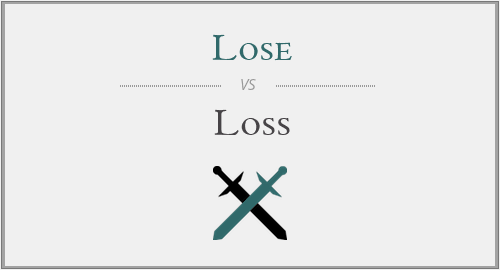Lose and loss are a pair of words that have somewhat similar meanings which cause the most people to confuse them and use them in each other’s place.
Today I will discuss the meanings and usage of both these words with examples so learners of English language can understand the real difference between them and use them accordingly.
Origin:
Loss originated from Old English los‘destruction’, of Germanic origin; related to Old Norse los ‘breaking up of the ranks of an army’ and loose; later probably a back-formation from lost, past participle of lose. The word lose originated from Old English losian ‘perish, destroy’, also ‘become unable to find’, from los ‘loss’.
Loss as noun:
The word loss is used as a noun which means the fact or process of losing something or someone.
Lose as verb:
Lose is word that is the verb in the sentence. It has the meaning of meaning of being robbed of something and something that no longer exists.
The word loss also means to become unable to find (something or someone).
Lose vs. Loss
To fail to win (a game or contest) is also known as lose.
Examples:
Lose or loss:
So lose and loss are two words that have somewhat similar meanings but one must remember that these are the words that actually need more focus while writing. Lose is used as a verb which indicates the action of losing something whereas loss is a noun which represents something that is lost.
Remember that lose and lost are not interchangeable.





Have a discussion about this article with the community:
Report Comment
We're doing our best to make sure our content is useful, accurate and safe.
If by any chance you spot an inappropriate comment while navigating through our website please use this form to let us know, and we'll take care of it shortly.
Attachment
You need to be logged in to favorite.
Log In